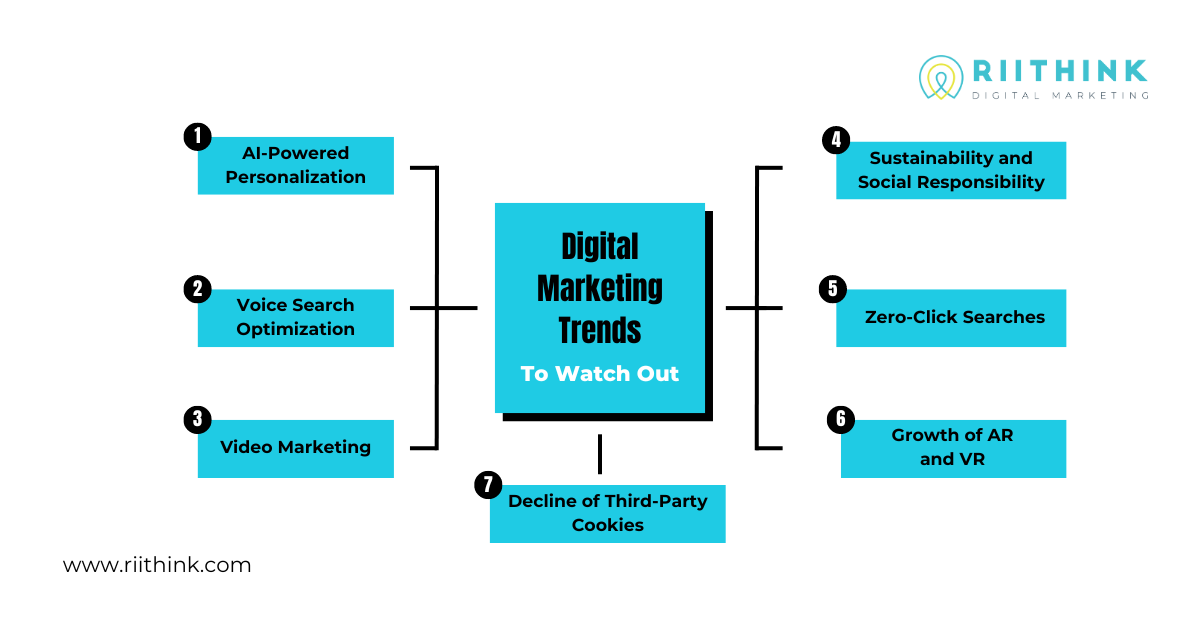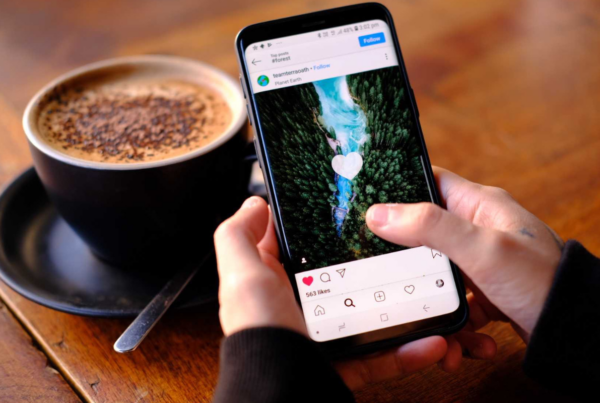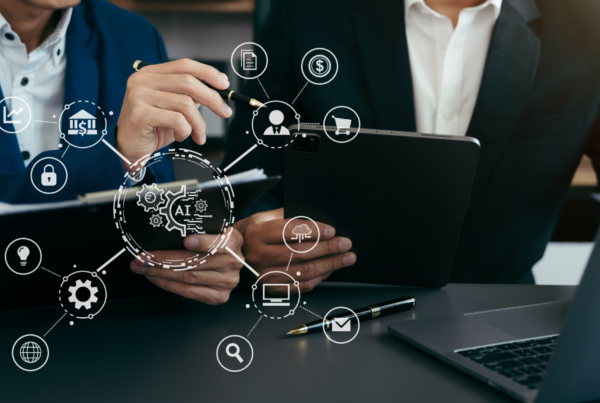In today’s fast-paced digital world, staying on top of marketing trends is crucial for businesses to remain competitive. As we approach 2025, the digital marketing landscape continues to evolve, driven by technological advancements and changing consumer behaviors. To keep up with these shifts, businesses must adapt their strategies to ensure they are providing relevant and engaging experiences for their audiences. With the right digital marketing services and SEO services in USA, you can position your brand at the forefront of innovation, build stronger connections with customers, and drive sustained growth.
In this blog, we’ll explore the top digital marketing trends that will dominate 2025. These trends are essential for any business looking to stay ahead of the curve, whether you’re a global corporation, a small startup, or a local business seeking to maximize its impact through local digital marketing services. Additionally, leveraging local SEO strategies like optimizing your Google Business Profiles can significantly boost your online visibility and help you connect with more potential customers in your area.
- According to a Semrush survey, 68% of companies have used AI to boost the return on their content marketing investments.
- In February, ChatGPT broke the record for the fastest-growing consumer app in history. According to OpenAI CEO Sam Altman, the app had over 100 million active weekly users as of November.
Leading Digital Marketing Trends To Watch Out

1. AI-Powered Personalization
Platforms for generative AI, such as ChatGPT and Google Gemini, are important developments in digital marketing that have already shown their worth for hundreds of different business types. They are the next step up in productivity, offering functions like idea generation, data organization and tabulation, and email drafting assistance.
Artificial Intelligence (AI) has become a key driver of innovation in the digital marketing landscape, and by 2025, its role will only expand. AI-powered personalization enables businesses to deliver highly tailored content, messages, and experiences to individual users. As data collection technologies improve, marketers can analyze consumer behavior in real time, predict preferences, and create highly personalized interactions.
Why It’s Important:
- Enhanced Customer Experiences: AI allows brands to offer customized experiences at scale, whether it’s personalized recommendations, emails, or ads. This level of personalization helps engage users, making them more likely to convert.
- Increased Engagement and Retention: Personalization increases customer loyalty by delivering relevant content that resonates with the audience, which leads to higher engagement and retention rates.
- Optimized Ad Spend: AI-powered tools help optimize ad targeting by predicting user intent and delivering ads to the right audience, reducing wasted ad spend.
2. Voice Search Optimization
As virtual assistants become more sophisticated, voice search is continuing to gain popularity. By 2025, it’s expected that voice search will account for a significant portion of all online searches, particularly for mobile users. Here are a few examples of popular voice-activated technologies driving this trend:
- Siri (Apple)
- Google Assistant
- Alexa (Amazon)
- Cortana (Microsoft)
- Bixby (Samsung)
3. Rise of Video Marketing
Video marketing has been on the rise for several years, and in 2025, it’s expected to become even more dominant. Video content is highly engaging, and with the growth of platforms like TikTok, YouTube, and Instagram Reels, short-form videos have taken center stage. Consumers now prefer watching quick, visually appealing videos over reading long articles or posts.
Why Video Marketing is Crucial:
- Higher Engagement Rates: Video content tends to capture attention more effectively than static content, and viewers are more likely to retain information presented in video form.
- Better Conversion Rates: Videos on landing pages, product pages, or social media platforms often lead to higher conversion rates compared to text or image-based content.
- Increased Reach: Algorithms on platforms like TikTok, Instagram, and YouTube prioritize video content, meaning businesses that invest in video marketing are more likely to reach larger audiences organically.
4. Sustainability and Social Responsibility in Marketing
Consumers are becoming increasingly conscious of the ethical and environmental impact of the brands they support. By 2025, sustainability and social responsibility will no longer be just a trend they will be an expectation from consumers. Brands that are transparent about their values and demonstrate a commitment to sustainability will be more successful in building trust with their audiences.
How to Incorporate Sustainability in Your Marketing Strategy:
- Authentic Storytelling: Share your brand’s story about sustainability efforts, such as how you source materials, reduce waste, or support social causes. Consumers appreciate transparency and authenticity.
- Eco-Friendly Practices: If your business adopts eco-friendly practices, such as reducing carbon emissions or using sustainable packaging, make sure these efforts are highlighted in your marketing campaigns.
- Partnerships and Certifications: Align your business with sustainability certifications (e.g., Fair Trade, B Corporation) or partner with non-profits to show your commitment to making a positive impact.
5. Zero-Click Searches and the Importance of Featured Snippets
Zero-click searches have been on the rise, driven by Google’s push to provide direct answers to users’ queries without requiring them to click through to a website. Featured snippets, knowledge panels, and instant answers are all examples of zero-click search results. By 2025, these types of searches are expected to dominate, and businesses must adapt their SEO strategies accordingly.
How to Optimize for Zero-Click Searches:
- Focus on Answering Questions: Content that is structured to answer questions directly is more likely to appear in featured snippets. Use headers, bullet points, and concise language to provide clear answers.
- Implement Structured Data: Schema markup helps search engines better understand the content on your website, increasing the chances of appearing in rich snippets and knowledge panels.
- Local Listings Optimization: For businesses offering local digital marketing services, optimizing Google My Business profiles and ensuring accurate local listings is essential for capturing zero-click search traffic.
6. Growth of Augmented Reality (AR) and Virtual Reality (VR)
Augmented Reality (AR) and Virtual Reality (VR) are rapidly gaining traction in the digital marketing world, providing new and immersive ways for consumers to interact with brands. From virtual try-ons in retail to immersive brand experiences in the metaverse, AR and VR are expected to play a significant role in digital marketing by 2025.
AR and VR Applications in Digital Marketing:
- Interactive Shopping Experiences: Retailers can use AR to allow customers to visualize products in their homes before purchasing. For example, virtual try-on features for clothing, accessories, or even makeup can enhance the shopping experience.
- Virtual Events and Brand Experiences: As virtual events continue to grow in popularity, businesses can use VR to create immersive experiences that allow customers to engage with their brand in unique ways.
- Enhanced Engagement: AR and VR can boost engagement by offering users interactive and memorable experiences, leading to higher brand recall and conversion rates.
7. Decline of Third-Party Cookies and the Shift to First-Party Data
In response to increasing privacy concerns and stricter regulations, third-party cookies are being phased out. By 2025, digital marketers will need to rely more heavily on first-party data—data collected directly from customers with their consent. This shift will significantly impact how businesses track users, personalize marketing, and measure campaign success.
How to Adapt to the Shift
- Invest in First-Party Data: Build trust with your audience by being transparent about data collection and offering value in exchange for their information. This could be in the form of personalized offers, exclusive content, or loyalty programs.
- Focus on Consent and Privacy: Ensure that your data collection practices comply with regulations such as GDPR and CCPA. Providing customers with clear opt-in options and respecting their privacy will help build long-term trust.
- Leverage Customer Relationships: Focus on creating strong relationships with customers through direct interactions such as email marketing, loyalty programs, and personalized content. These channels allow for better data collection while respecting user privacy.
Prepare for the Future with the Right Digital Marketing Partner
Rapid technological advancements, shifts in consumer behavior, and increasing demand for personalization, transparency, and immersive experiences will drive online marketing in 2025. Staying ahead of these trends will require agility and forward-thinking strategies.
Whether you’re a global brand or a small business, partnering with a professional digital marketing company in USA like Riithink can help you navigate the complexities of this evolving landscape. Riithink’s expertise can ensure that you effectively implement these trends, keeping your business competitive and poised for growth in the years to come.
By staying on top of these trends, your business can harness the power of AI, video marketing, voice search, and more while building more robust, authentic customer relationships. From optimizing for zero-click searches to embracing sustainability and immersive technologies, 2025 promises to be an exciting year for marketing.







